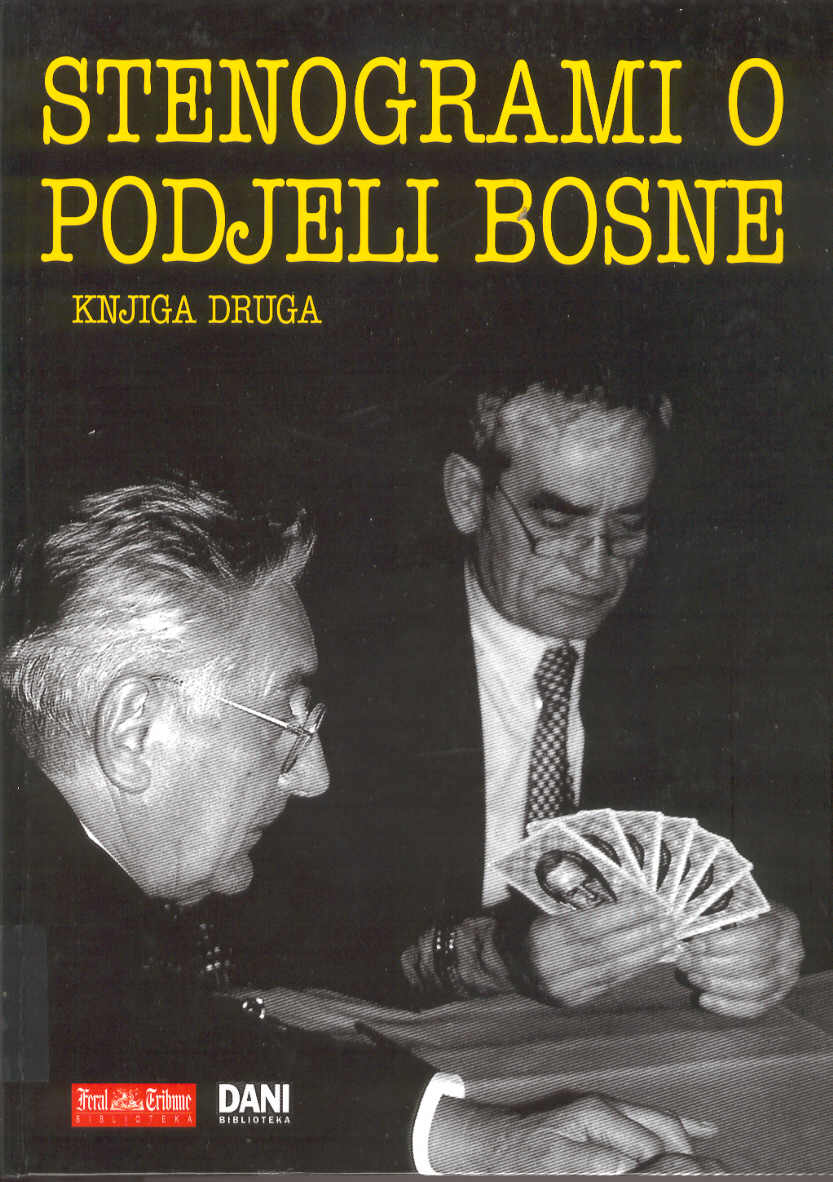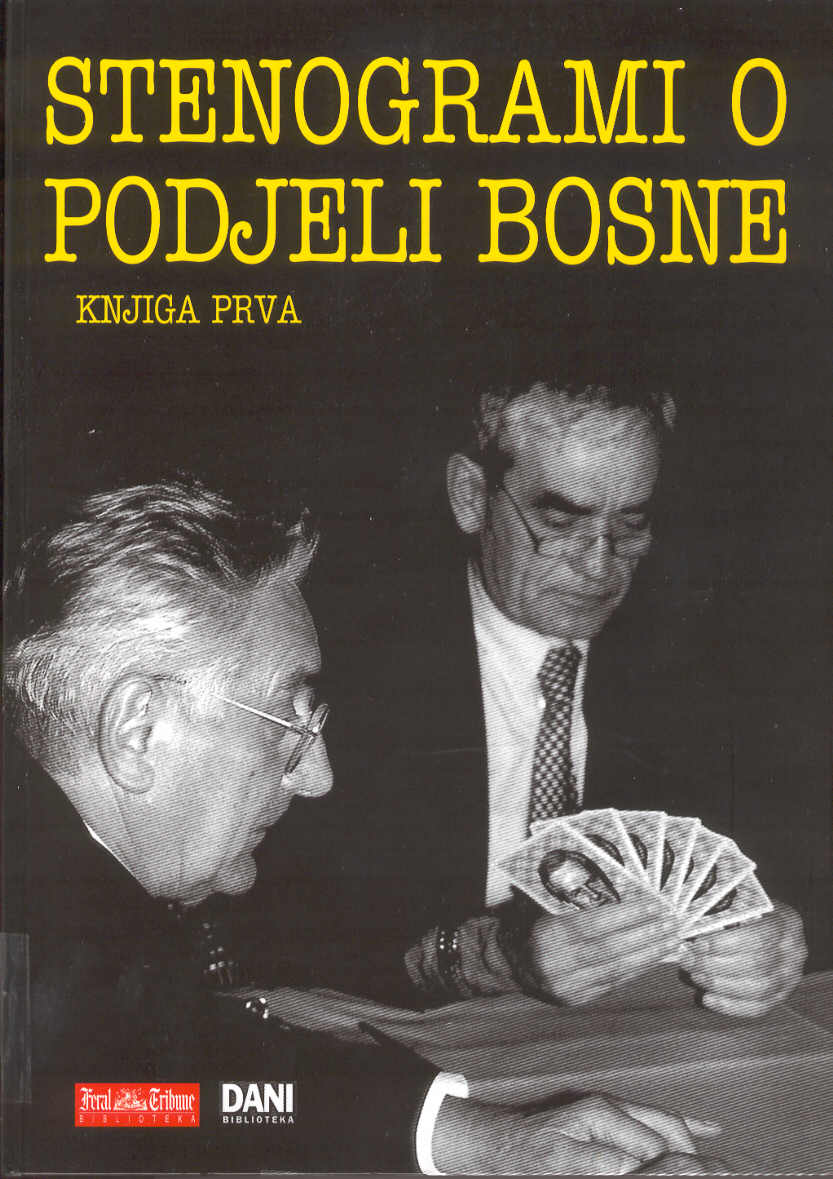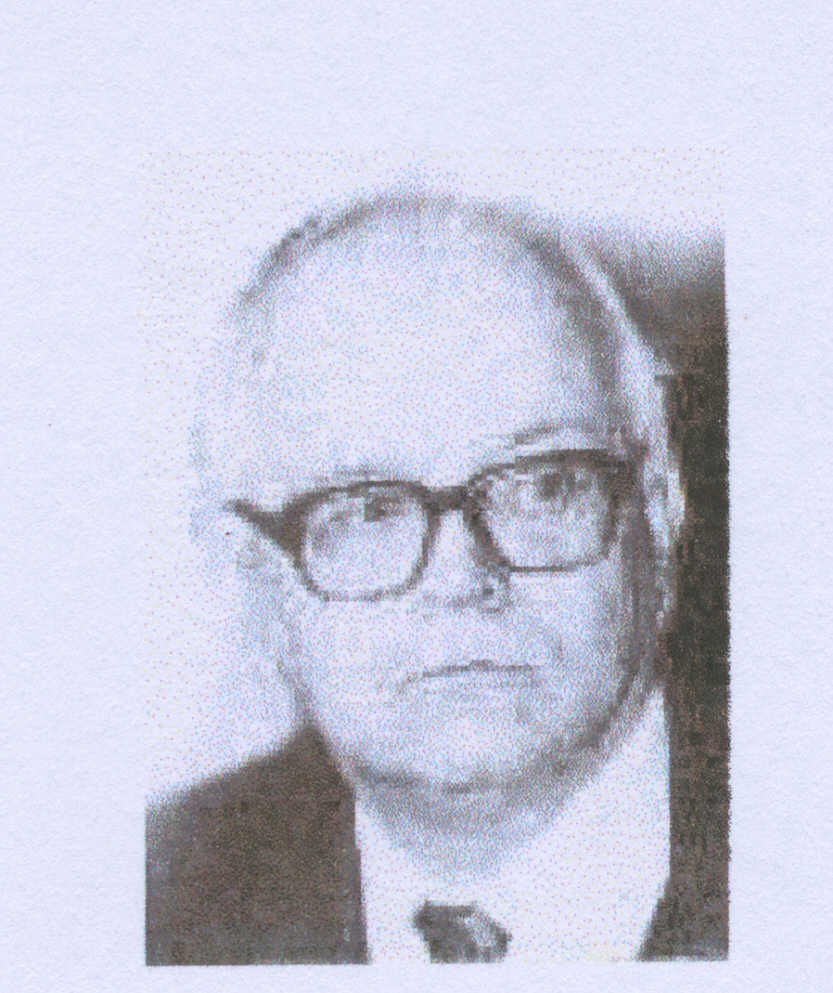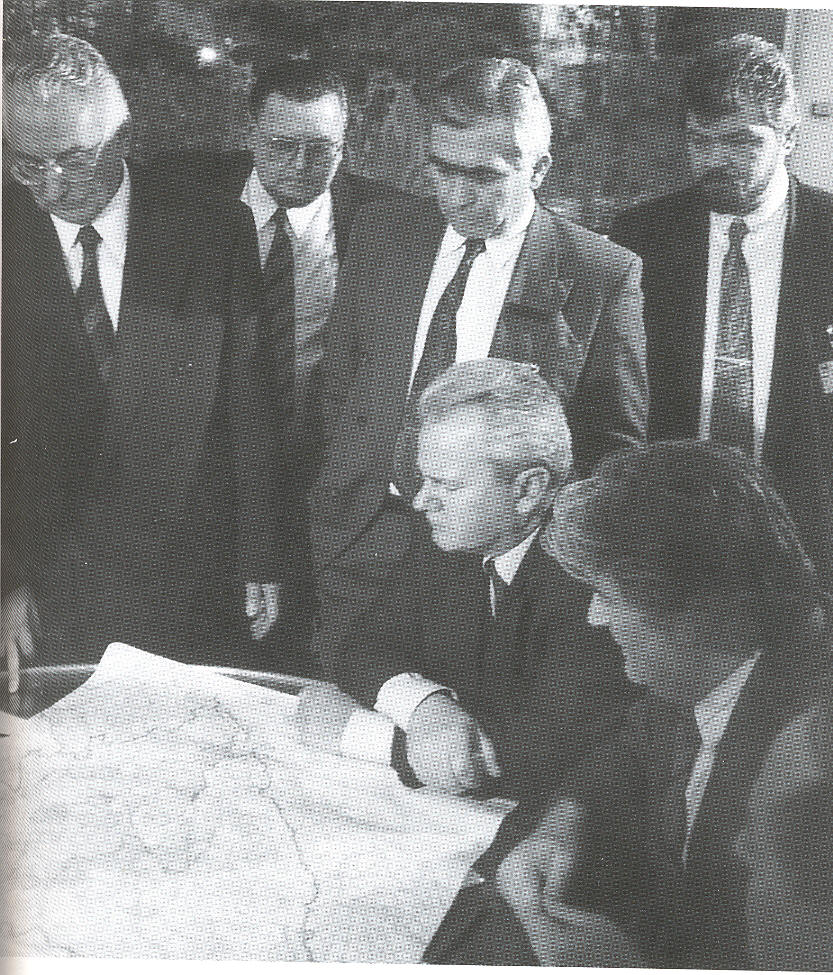 |
Tudman and Koljevic in a fraternal embrace
by Ivan Lovrenovic

  The recently published Stenogrami o podjeli Bosne [Transcripts on the partition of Bosnia], published in two volumes by Biblioteka Dani (Sarajevo) and Feral Tribune (Split), with the help of the Heinrich Böll Foundation, ‘speak more eloquently than any documentation previously published in one place about the Bosnian policy of Franjo Tuđman and his Herzeg-Bosna acolytes and agents’. The recently published Stenogrami o podjeli Bosne [Transcripts on the partition of Bosnia], published in two volumes by Biblioteka Dani (Sarajevo) and Feral Tribune (Split), with the help of the Heinrich Böll Foundation, ‘speak more eloquently than any documentation previously published in one place about the Bosnian policy of Franjo Tuđman and his Herzeg-Bosna acolytes and agents’.
The first war year of 1991 was coming to an end. By then the historiophiles, prone to cheap mystifications, who were almost as numerous in the former Yugoslav lands as the number of their inhabitants, were already being dizzied by the ominous ambiguity in that numerological ‘recurrence’: 1941 - 1991 - and four years later would find the end of the war arriving on schedule:1945 - 1995. Yet most Bosnians and Herzegovinians still did intimately experience that year of 1991 as a war year in the full meaning of the term. I used to watch as new death notices made their appearance on the trees and trolley-bus poles along Zagrebačka street in Grbavica [Sarajevo], for ‘heroes fallen in the struggle against the vampire-like fascism of Tuđman’s Ustashe’, noting that it was Vukovar and other place-names in Slavonia that cropped up as the most frequent sites of these ‘heroic deaths’, places hitherto familiar in the imagination of the average Yugo-citizen only for their legendary tranquillity, the well preserved beauty of their baroque urban layout and architecture, and their hedonistic existence.
It is not that people did not know about the tragedy of the village of Ravno [in Herzegovina], which the JNA in the context of its campaign against Dubrovnik had razed to the ground killing all its inhabitants. But in the contemptuous and ignorant Sarajevo perception (‘some Ustasha backwater, somewhere down there among the godforsaken rocks of Herzegovina’) that was of too little concern to official Bosnia-Herzegovina for it to be experienced as the beginning of its own war. The same was true with Bosanski Brod, not to mention General Uzelac and his Second Corps at Banja Luka, which throughout the late summer and autumn of that year had been an active marshalling ground for the war in Slavonia, yet in Sarajevo that bloody fact was not worthy of any notice at all.
Preparing for war in Bosnia
In hellish parallelism with the chronicle of war, various other things happened in that late 1991. Including this: intensive negotiations under the aegis of the international community about a general cease-fire and the transfer of the JNA to the Serb ‘krajine’ [marchlands] in Croatia and Bosnia-Herzegovina. Do we not remember how an agreement was concluded, precisely in Sarajevo, and how from the beginning of January 1992 there was officially no longer a war in Croatia? Then, no less interesting, in December of that same 1991 the ‘Serb Republic of Bosnia-Herzegovina’ was proclaimed, with Karadžić becoming its first president. And a bit before that, on 12 November, Mate Boban and 22 local HDZ members from Herzegovina and central Bosnia, at a secret meeting in Grude, explicitly invoking the conclusions of meetings with Tuđman on 13 and 20 June 1991 (note the dates!), demand that ‘steps be taken to formulate and publish legal and political documents (proclamation of a Croat banovina in Bosnia-Herzegovina, organization of a referendum for its accession to the Republic of Croatia) as the first stages on the road to a final solution of the Croat question and the establishment of a Sovereign Croatia within its ethnic and historic (now attainable) frontiers’.
All this was followed by a huge new-year interview with the president of Croatia Franjo Tuđman, carried by all daily newspapers in Croatia and all the main world press agencies. Tuđman spoke in triumphalist vein, just as though he were the real and final victor of the war. ‘Only’ the problem of Bosnia-Herzegovina remained, viewed by him within the narrow perspective of ‘a lasting solution to Croat-Serb relations’, for which an ethnic and territorial partition of B-H was the essential precondition. Even before that, Tuđman had on many occasions ‘solved’ this problem in all its pseudo-historical variants, but never until then in so politically precise and programmatically clear a manner. The words from the pages of Vjesnik - edited on his behalf by the eternally promising and respectful ‘civil servant’ of journalism, later one of Tuđman’s diplomats, Hidajet Biščević - were like hammer blows: ‘This [the defusing of friction between Serbs and Croats] can be achieved in such a way that Serbia’s national aims are achieved and she no longer has any reason for expansion, and at the same time Croatia’s territories would be attached to her, since the croissant shape of present-day Croatia is unnatural.’ Or: ‘It is in Croatia’s interest for this problem to be resolved in the natural way, in the way that the Banovina was resolved. In the process a part of "little Bosnia" could remain, where the Moslems would have a majority, and this state of Bosnia could be a buffer between Croatia and Serbia. In this way the colonial invention of Bosnia-Herzegovina would simultaneously disappear too.’
From our Sarajevo and B-H (which we believed must organically mean also Croat) perspective, we returned countless times to these words, fatally beguiled by the manic brazenness and callousness with which, as a ‘lasting solution to a problem’, they demanded the death of Bosnia-Herzegovina and our own: moral and social, state-political and national - and, as time would speedily show in an appallingly large number of cases, also human. But there was something in Tuđman’s ‘ideas’ that seemed even worse, that killed off even our last illusions about the eventual possibility that some anti-Tuđman might appear on the Croatian scene, some sufficiently powerful public force - a calm political mind, an energetic and effective spiritual warning adequate in strength and dignity to the demand of the period and the moment - to denounce those ideas and prevent their implementation... Such a force did not appear and Tuđman’s programme, as was speedily shown likewise, did not merely remain the basic ideological constant of Tuđman’s ‘Bosnian policy’, but was bloodily concretized in the form of action, in the systematically devised modus operandi of that entire policy (concerning which the Transcripts provide proof and testimony in abundance).
A letter with five initials
We were forced into action as much by the notorious ‘Croatian silence’ as by Tuđman’s ‘programme for Bosnia’. Our gesture was conceived of as a mass protest and appeal, but in the end was reduced to two sets of initials (or five, to be literal): in alphabetic order (leaving aside my humble self) Miljenko Jergović, Ivo Komšić, Ivan Kordić and Mile Stojić. I shall say nothing more here about the open letter to Tuđman that we then published in Vjesnik, about the excommunicatory replies that Tuđman sent us by the hand of his then adviser Professor Zvonko Lerotić, or about the angry commentaries that are still published today from time to time.
But I confess openly that I was moved to such an introduction to the reading of these two volumes of Transcripts on the partition of Bosnia - which speak more eloquently than any documentation previously published in one place about the Bosnian policy of Franjo Tuđman and his Herzeg-Bosna acolytes and agents - by a detail from the beginning of Volume I. This is the place where Tuđman on 8 January 1992 in Zagreb receives Nikola Koljević and Franjo Boras (still official members of the B-H Presidency). As a reminder, this was the day before Karadžić’s proclamation of the state of Republika Srpska at Banja Luka on 9 January - a day that is still a public holiday there.
Pathetically dated Sarajevo, 6 January 1992, Feast of the Epiphany, our letter at that moment had already reached the hands of Vjesnik’s chief editor Hidajet Biščević, but had not yet been published.
Amicable chit-chat
 So two days after Epiphany the Academician and the eminent university professor from Sarajevo Koljević, who in 1991 was to Karadžić what in ‘41 Stevan Moljević had been to Draža Mihailović, sit in leisurely and amicable chit-chat at the Ban’s Palace on St Mark’s Square, residence of the president of Croatia, a Croatia that the Serb Koljević-Moljević army had only just before been massacring and carving up. They were accompanied by the Croat mummy from the B-H Presidency Boras, so that he too might say his two words. Academician Tuđman asks Professor Koljević all manner of things concerning ‘the colonial invention of Bosnia-Herzegovina’, and the latter readily and at length furnishes him with explanations, information, Serb positions, and in every way one can see and feel how a warm current of understanding and so to speak immanent agreement is flowing there, brother, far deeper than anything laid down by diplomatic rules and protocol. And at one intimate moment Tuđman will complain to Koljević about how the two of them understand one another marvellously, and yet down there in Bosnia there are hotheads among the Croats who are opposed to his ideas. And he will ask him for advice and information: ‘You’ve read the letter from those... what are they?’ And Koljević, an expert on Tuđman’s ‘those...what are they?’, readily interprets for his distressed host, comforting him sympathetically: ‘I know all these intellectuals, since I’ve spent time in those literary waters, you know, and there’s no great intellectual here.’ So two days after Epiphany the Academician and the eminent university professor from Sarajevo Koljević, who in 1991 was to Karadžić what in ‘41 Stevan Moljević had been to Draža Mihailović, sit in leisurely and amicable chit-chat at the Ban’s Palace on St Mark’s Square, residence of the president of Croatia, a Croatia that the Serb Koljević-Moljević army had only just before been massacring and carving up. They were accompanied by the Croat mummy from the B-H Presidency Boras, so that he too might say his two words. Academician Tuđman asks Professor Koljević all manner of things concerning ‘the colonial invention of Bosnia-Herzegovina’, and the latter readily and at length furnishes him with explanations, information, Serb positions, and in every way one can see and feel how a warm current of understanding and so to speak immanent agreement is flowing there, brother, far deeper than anything laid down by diplomatic rules and protocol. And at one intimate moment Tuđman will complain to Koljević about how the two of them understand one another marvellously, and yet down there in Bosnia there are hotheads among the Croats who are opposed to his ideas. And he will ask him for advice and information: ‘You’ve read the letter from those... what are they?’ And Koljević, an expert on Tuđman’s ‘those...what are they?’, readily interprets for his distressed host, comforting him sympathetically: ‘I know all these intellectuals, since I’ve spent time in those literary waters, you know, and there’s no great intellectual here.’
All that remains is the bare facts. After editor Hidajet had carried out his chief-editorial role as postman, Tuđman - having received from the intellectual Koljević reliable information and descriptions - approved the publication of the letter by editor Hidajet six days later, and entrusted his scholarly henchman Lerotić with the task of flaying the moral, patriotic and national scalps of the five in the same issue.
Two months after the comfortable exchange and harmonization of opinions with Tuđman in the idyll of a January evening in Zagreb’s Upper Town, the intellectual Koljević took ‘to the hills’ as an outlaw and became one of the most important political participants in the bloody crime against his own city and against Bosnia-Herzegovina as a whole. He saved himself from human justice somewhat later with a bullet from a revolver. (‘He died by criminal hand’ - as his suicide was described in the merciless cynicism of occupied Sarajevo’s citizens.) From the justice of the Lord, in which they say he believed with Orthodox fervour, he will have difficulty in saving himself, if such exists. Or perhaps he will, since people claim that His ways are inscrutable, and one lost sheep is dearer to Him and more important than the whole flock.
So far as Sarajevo is concerned, thirteen years after the amicable chat between Tuđman and Koljević, things are as they are. (See the selection and composition of the new City council and leaders; see the report of the director of a state institution in which the Bosnian nationalities are listed as follows: Bosniaks, Catholics, Orthodox; see... and so forth.) All the ‘merits’ for the establishment of a disparate ethnic partition of Bosnia do not belong precisely to those two, since in that epochal task it would be quite wrong to overlook the role of the SDA and the political legacy of Izetbegović. But as to whether the ideas and endeavours of the late academician and the dear departed professor should be underestimated - well, they should not!
Translated from Dani (Sarajevo), 8 April 2005

Mapmaking
|